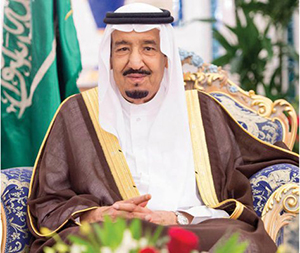Jeddah, Aug 8: Custodian of the Two Holy Mosques King Salman on Sunday issued a series of directives to agencies concerned to address once and for all the cases of distressed workers of companies who have contracts with the government.
The king directed the Minister of Labour and Social Development to take necessary measures, in coordination with the Ministry of Finance, to oblige contracting companies to pay the salaries of their employees in accordance with the government's Wage Protection Program that ensures workers' salaries are fully paid.
According to sabq.org, the directive is for the government not to release what it owes those companies unless the Labor Ministry confirms that the companies have paid on time what they owe their employees.
The king's directives comes amid increasing complaints by workers that they have not been paid their salaries for months. Construction giant Saudi Oger, for one, has been the subject of complaints by thousands of its workers for not paying their salaries for the past nine months.
The issue came to a head when hundreds of expatriate workers of the company marched on the streets in Jeddah to air their grievances, saying that Saudi Oger management has simply ignored them.
Accomodation, exit visas
In one of his directives on Sunday, King Salman authorized the labor minister to also immediately address the housing and accommodation services of the distressed workers by contracting with companies that provide such services.
While the government of India and the Philippines as well as their communities in the kingdom have rallied behind their compatriots at Saudi Oger by providing them food, those of other nationalities have reportedly not gotten the same attention.
According to the king's directive, the cost of these services for the distressed workers are to be deducted from the employers' receivables from the government.
The king also commissioned the labor minister to coordinate with the Saudi Arabian airlines to transport foreign workers who wish to return to their countries and to charge the cost to their employers. The labor minister is also authorized to contract with legal consultancy agencies to pursue the financial claims of the workers in local courts.
In the case of workers in distress who wish to leave the kingdom, the king directed the Passport Department to facilitate issuance of final exit visas in coordination with the Foreign Ministry and relevant agencies.
SR100 million fund
An amount of SR100 million is to be deposited in the Saudi Arab Fund account for use to fulfill the king's orders. The fund is to be under the disposal of the labor minister, who will provide the Ministry of Finance with all details of the expenditures and the amounts spent. The Finance Ministry will then deduct the spent amounts from the floundering companies' accounts.
The king also instructed the labor minister to meet with representatives of countries concerned to discuss the issue of unpaid salaries and to explain the steps taken by the kingdom to address such issues.
“King Salman also directed labor minister to coordinate with the minister of culture and information to highlight the kingdom's efforts aimed at ending the suffering of the distressed workers especially the Indian and the Filipino workers and to ensure that this case was a mere individual mishap by one company and the number of affected workers is insignificant compared with the millions of other expats who are working in the public and he private sectors in KSA,” Sabq.org said.




Comments
Please sir
This is a true quality and nature of blood, there is no Gangasara and energy of Haram mixed with their blood like our Indian Bakwas ministers, long live KSA and King Salman for the prompt step and to prove that your country is a safest and peaceful in the world
Dear Dombiah,
Please don't play dombarata.
Coastal Digest may pro-Saudi. But it is not anti national.
Though pockets of unrest here, Still Saudi is the safest and peaceful place to live on.
God bless KSA
Generosity...Al Hamdulillah
May Allah bless kingdom and the King Salman for his kind gesture.
Even our Govt also did amazing job by reaching out to those hard working people.
Good job His Royal Highness! May Allah help you.....you are just doing exactly what is said in the Holy Book of Quran....
Add new comment